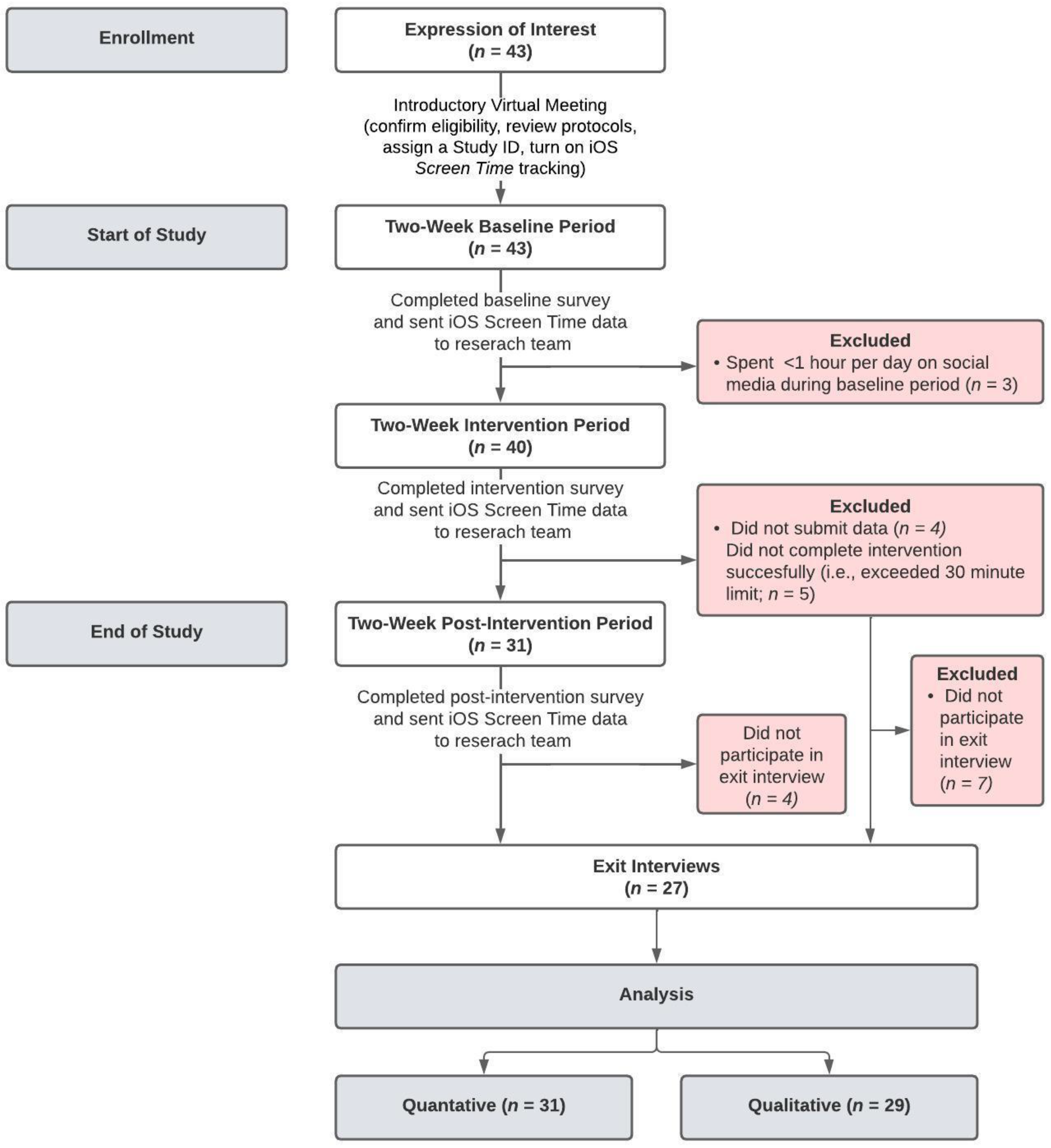Can a Two-Week Social Media Detox Improve Health and Happiness? (Research Review)
Social media overuse has been linked to sleep disturbances, heightened stress, and decreased life satisfaction. Could taking a break from scrolling help? A recent study sought to answer this by examining the effects of a two-week social media detox for young adults.
According to reports in February 2024, adults in the US ages 18-24, spent an average of 186 minutes per day engaging with social media platforms – that’s over 3 hours! Respondents ages 65 and older spend approximately 102 minutes of their day to social media – that’s nearly 2 hours!
The Social Media Detox Study: Methods and Participants
Researchers recruited 31 young adults, aged 18 to 30, for a social media detox intervention. Participants were asked to limit their daily social media use to just 30 minutes for two weeks. This period was preceded by a baseline phase (no restrictions) and followed by a two-week post-intervention phase to track lasting effects.
Data collection included smartphone usage stats and surveys on: stress, sleep, and life satisfaction. Researchers also conducted semi-structured interviews to gather personal experiences.
Key Findings
The detox led to notable improvements in several areas:
Reduced Smartphone and Social Media Addiction
Participants showed significant reductions in social media usage during the intervention, cutting their time by 77%. Even after the detox ended, addiction levels remained lower than at baseline.Better Sleep
Participants experienced longer, higher-quality sleep. Many reported falling asleep faster and waking up more refreshed without the temptation of late-night scrolling.Enhanced Awareness and Habits
Many participants became more mindful of their social media use and expressed a desire to maintain some restrictions post-detox. They reported spending more time on hobbies, connecting with loved ones, or simply enjoying offline moments.Decreased Stress and Increased Life Satisfaction
Stress levels dropped significantly during the detox, and participants felt more satisfied with their lives. The detox allowed them to focus on productivity and reduce comparisons often triggered by social media.
The Stats:
Mean stress scores reflected a 14.4% reduction in stress from pre-intervention to the detox phase:
Pre-intervention: 18.39
During intervention: 15.74
Post-intervention: 16.84
Life satisfaction increased during the detox by 7.4% and remained post-intervention.
Pre-intervention: 23.94
During intervention: 24.90
Post-intervention: 25.71
Participant Reflections
Participants shared a range of insights about their experience:
Relief and Enjoyment: Many felt less pressure to maintain an online presence and enjoyed the break.
Challenges in Adjusting: Initial discomfort came from disrupted routines, like filling small pockets of time between tasks.
Post-Detox Behavior: Some indulged in brief social media binges after the detox but quickly reverted to more mindful habits.
Increased Awareness: Participants noted they were more conscious of their social media usage, with some choosing to set ongoing limits.
Practical Takeaways for Your Own Social Media Detox
If you're considering a social media detox, here are some tips inspired by the study:
Set Realistic Limits: Thirty minutes per day was manageable for most participants. Start with a goal that feels achievable. If you’re at 2+ hours a day, cut back in 15-20 minute increments.
Turn Off Notifications: Reducing distractions can make it easier to stick to your plan.
Focus on Problematic Apps: If one app takes up most of your time, consider limiting it first.
Get an App that Restricts You: You can download apps such as Opal or Jomo can help restrict you from screen/social use.
Replace Scrolling with Meaningful Activities: Fill downtime with hobbies, reading, or connecting with loved ones.
Pair Screen Time with a “Healthy” Activity: For example, only allow yourself to scroll social media when you’re on the treadmill or elliptical.
Implications for Well-Being
This study highlights the potential benefits of reducing social media use. A short-term detox can lead to better sleep, reduced stress, and improved satisfaction with life. While not everyone will need—or want—a complete detox, small changes can still yield meaningful results.
Social Media: Managing Use Reasonably
Personally, I enjoy learning from colleagues and friends on social media, as well as the occasional funny meme. We can all use a laugh! I like to think of my time on social media as an episode of a show. I wouldn’t usually watch three hours of TV daily, but I might watch 20–30 minutes to wind down.
This mindset gives my brain a chance to “cool down” while scrolling, without overheating from an overload of information.
I encourage you to find a balance that supports your mental, physical, and emotional well-being. Reducing stress, improving sleep, or reclaiming time for yourself might begin with resetting your daily screentime. A social media detox could help you establish a healthier baseline for your well-being.
If you’re having trouble limiting your screen time and find that it’s impacting your quality of life, consider working with one of our coaches, with or without ketamine therapy.

